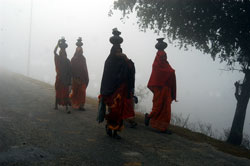 MIN RATNA BAJRACHARYA |
In the amorphous field of cultural studies, there is an even more rarefied stream called the anthropology of emotions. The penchant for neologism among cultural anthropologists is notorious?they borrow or invent definitional terms with almost every research paper they write.
To illuminate the importance of place, American scholar of history of
geography John Kirtland Wright (1891-1969) coined the term 'geopiety' with which he attempted to explain attachments people have either for their homeland or for destinations of reverence such as Jerusalem, Lhasa, Lumbini, Mecca, Rome or Banaras.
Extending Wright's concept of spatial veneration, the Chinese-American geographer of human emotions Yi-Fu Tuan propounded that it is in fact 'topophilia' that lies behind one's affection for one's native land. In other words: it is just an intense yearning for home.
The romantic notion of home is a place where the heart is at peace with itself and the world. Such a territory exists only in the imagination. In real life, the concept of home is a strange mix of nostalgia and desires.
Mithila embodies both. It still celebrates the involved detachment of King Videha, reveres the practical philosophy of Sage Yagyavalkya and sings songs of 14th century poet extraordinaire Vidyapati. Meanwhile, forward-looking Maithils have spread around the world to earn a living or simply to satisfy wanderlust. But no matter where they live, a Mithila-born is a Maithil forever.
The Madhes is a political construct, once a pejorative identity that exerted respectability through organised agitation and a spontaneous movement culminating in a mass uprising that forced the state to accept the idea of federalism. But Mithila is a lived experience that exists in language, literature, arts, painting, customs and cultural practices. Hence, it's also a significant force in national politics.
It's not just Madhes-based parties like Sadhbhabana, MJF or TMDP that have to rely upon Mithila to recruit Madhesi cadres and groom their possible leaders. Barring exceptions like Hridayesh Tripathi or Sarbendra Nath Shukla, almost the entire line-up of ethnic Madhesis even in 'national' parties is exclusively Maithil. That may be the reason federalism inspires intense emotions and heated debates herein Janakpur.
OMOP, they call it now: One Madhes One Pradesh. Leaders of the MJF, Sadhbhabana and TMDP admit in private that this concept lost its relevance with the acceptance of federalism and inclusion as guiding principles for the new constitution. MJF and a splinter group of Sadhbhabana are coalition partners of the ruling alliance.
TMDP has just upped the ante by calling for an agitation to mark the anniversary of the agreement between the government and the United Democratic Madhesi Front on 28 February 2008. But more than totalitarian-minded Maoists, it is the mainstream parties who seem to be having second thoughts about federalism.
The UML has reinforced its exclusivist nature by roundly defeating Ram Chandra Jha and Raghubir Mahaseth for secretaryship of the party in Butwal this week. The NC is also wavering, and Girija Prasad Koirala repeatedly harps on the dangers of federalism, knowing fully well that the demands for self-determination are now irreversible.
When constituent assembly members come here to collect suggestions for a new constitution, they will probably get conflicting opinions about OMOP and demand for a Videhabhumi encompassing Morang-Sunsari in the east, Rautahat in the west, Bhitrimadhes in the north and everything in between.
Such a territory seems to satisfy Koirala's strictures against ethnic federalism and his support for economically viable provinces. The former NC-stronghold is waiting for the stand that the party of Ram Baran Yadav takes to address their aspirations for self-rule.



